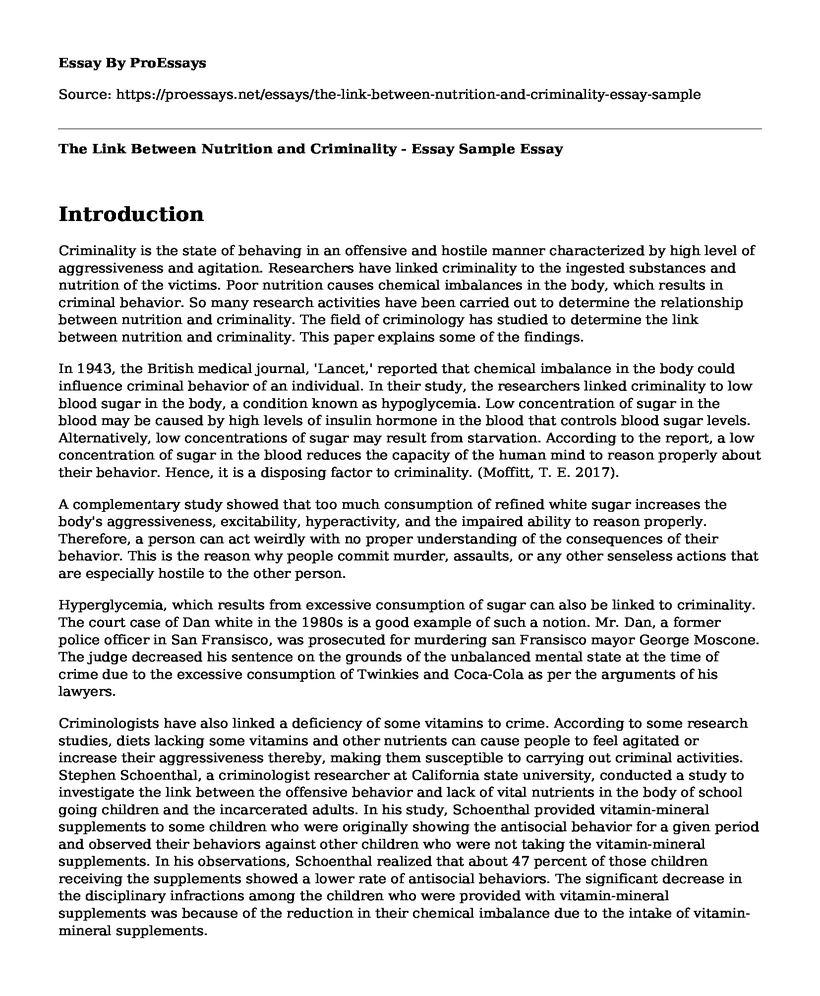Introduction
Criminality is the state of behaving in an offensive and hostile manner characterized by high level of aggressiveness and agitation. Researchers have linked criminality to the ingested substances and nutrition of the victims. Poor nutrition causes chemical imbalances in the body, which results in criminal behavior. So many research activities have been carried out to determine the relationship between nutrition and criminality. The field of criminology has studied to determine the link between nutrition and criminality. This paper explains some of the findings.
In 1943, the British medical journal, 'Lancet,' reported that chemical imbalance in the body could influence criminal behavior of an individual. In their study, the researchers linked criminality to low blood sugar in the body, a condition known as hypoglycemia. Low concentration of sugar in the blood may be caused by high levels of insulin hormone in the blood that controls blood sugar levels. Alternatively, low concentrations of sugar may result from starvation. According to the report, a low concentration of sugar in the blood reduces the capacity of the human mind to reason properly about their behavior. Hence, it is a disposing factor to criminality. (Moffitt, T. E. 2017).
A complementary study showed that too much consumption of refined white sugar increases the body's aggressiveness, excitability, hyperactivity, and the impaired ability to reason properly. Therefore, a person can act weirdly with no proper understanding of the consequences of their behavior. This is the reason why people commit murder, assaults, or any other senseless actions that are especially hostile to the other person.
Hyperglycemia, which results from excessive consumption of sugar can also be linked to criminality. The court case of Dan white in the 1980s is a good example of such a notion. Mr. Dan, a former police officer in San Fransisco, was prosecuted for murdering san Fransisco mayor George Moscone. The judge decreased his sentence on the grounds of the unbalanced mental state at the time of crime due to the excessive consumption of Twinkies and Coca-Cola as per the arguments of his lawyers.
Criminologists have also linked a deficiency of some vitamins to crime. According to some research studies, diets lacking some vitamins and other nutrients can cause people to feel agitated or increase their aggressiveness thereby, making them susceptible to carrying out criminal activities. Stephen Schoenthal, a criminologist researcher at California state university, conducted a study to investigate the link between the offensive behavior and lack of vital nutrients in the body of school going children and the incarcerated adults. In his study, Schoenthal provided vitamin-mineral supplements to some children who were originally showing the antisocial behavior for a given period and observed their behaviors against other children who were not taking the vitamin-mineral supplements. In his observations, Schoenthal realized that about 47 percent of those children receiving the supplements showed a lower rate of antisocial behaviors. The significant decrease in the disciplinary infractions among the children who were provided with vitamin-mineral supplements was because of the reduction in their chemical imbalance due to the intake of vitamin-mineral supplements.
Conclusion
In conclusion, chemical imbalances in the body due to the improper diet can cause increase a person's aggressiveness thereby making them susceptible to doing criminal activities. The excessive consumption of sugar, especially the refined white sugar, causes hyperglycemia which can be linked to the crime. Moreover, deficiency of some vitamins and minerals in the diet can increase aggressiveness, hyperactivity, and impaired reasoning capacity which eventually predisposes a person to criminal acts. Having considered these factors, it is evident that poor nutrition can be linked to the crime.
Reference
Moffitt, T. E. (2017). Adolescence-limited and life-course-persistent antisocial behavior: A developmental taxonomy. In Biosocial Theories of Crime (pp. 69-96). Routledge.
Cite this page
The Link Between Nutrition and Criminality - Essay Sample. (2022, Oct 25). Retrieved from https://proessays.net/essays/the-link-between-nutrition-and-criminality-essay-sample
If you are the original author of this essay and no longer wish to have it published on the ProEssays website, please click below to request its removal:
- Restorative Justice and the Victim of the Crime
- Can Marijuana Make It Better?
- Research Paper on Jodi Arias and the Killing of her Boyfriend, Travis Alexander
- Essay Example on Criminal Justice, Intercultural Prejudice, and Employment Opportunities
- Essay Sample on Gun Control: Do We Need to Take Further Action?
- Intelligence: Key to Homeland Security Success - Research Paper
- U.S. Prisons: Angola Louisiana State Correctional Facility - Essay Sample







